Have you ever thought about living in the Caribbean, enjoying sunny beaches, tropical weather, and a strong local culture? If that rings a bell, then Cancun might have popped up in your conversations.
Located just north of Mexico's Caribbean coast resort area known as the Riviera Maya, Cancun is a great place if you are after a forever-on-vacation lifestyle. Living here means enjoying Mexico's traditional lifestyle, delving into the rich Mayan history, and relishing modern conveniences.
So, let's explore what life in Cancun is like for expat retirees.
Secure Peace of Mind with Best-Value International Health Coverage
International Citizens Insurance provide free, no-obligation quotes from the leading international health insurance providers with plans tailored to meet your needs. Trusted by thousands of expats worldwide.
Cancun highlights
A large city with a small-town feel, Cancun is super popular with American expats who want to live somewhere sunny, fun, and close to an international airport.
The main pros are:
- Warm weather
- Great beaches
- Relatively low cost of living
- Good infrastructure
- Friendly local population
- Lots of people speak English, so it's easy to get around and make friends.
Living in Cancun is like living on a tropical vacation in a very popular tourist spot all year round! It might be not for everyone, but if it's your idea of perfect, Cancun is the right spot for you.
Climate and weather
One of the defining features of Cancun is its tropical climate, which graces the city with warm temperatures throughout the year.
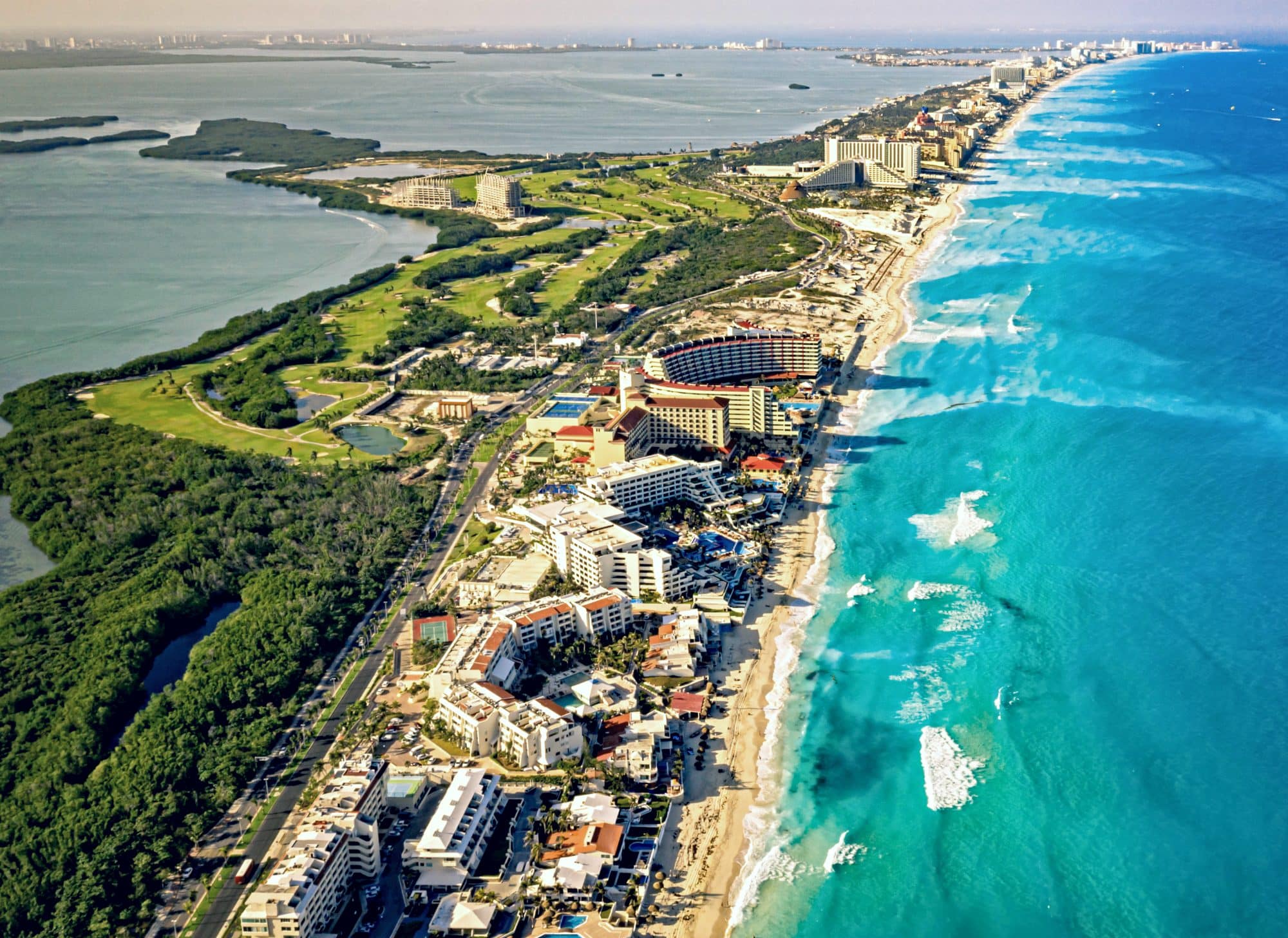
The summers are hot and humid, with temperatures above 30°C (86°F). Winters, on the other hand, are milder and less humid, making them an ideal choice for those who prefer slightly cooler and more comfortable weather. Both seasons may appeal to different types of people.
The rainy season showers Cancun from May to October, with September and October being the wettest.
Cancun's tropical climate is one of the top reasons folks move to Mexico, as it ensures sunny days on the beach for most of the year.
The cost of living
One of the most enticing aspects of living in Cancun is the cost of living, which is notably lower than in many North American and European cities.
Locally-produced goods are very affordable. A domestic beer in Cancun is only about $3, whereas in the US or Canada, you might pay $8 for a beer downtown.
Of course, prices can be higher in tourist-heavy areas, where demand for goods and services from visitors can drive up costs. Imported products may also come with a premium price tag.
In light of this, we recommend you adopt a savvy approach to managing your costs in Cancun. By carefully dividing your spending between local markets and high-tourist zones, you can stretch your budget and enjoy all that this Mexican paradise has to offer.
Also, bizarrely enough, sometimes you will pay more for veg in Mercados (markets) than in supermarkets. On the plus side, you will get it as fresh as possible while supporting local farmers.
Yes, it's true that other places in Mexico are more affordable; however, it is still much cheaper to live in Cancun than in most American cities. Here are some monthly expenses:
| Expenses | Avg. monthly cost in USD |
|---|---|
| Rent for 1 Bedroom Apartment (City Center) | $650 |
| Utilities (Electricity, Gas, Water, Garbage) | $80 |
| Internet (60 Mbps or More) | $35 |
| Groceries | $200 |
| Restaurant (Meal for 2, mid-range, three-course) | $30 |
How much a retired couple need to live in Cancun
Let's say you want to rent a 2-bedroom modern apartment in a complex with a pool, gyms, and other conveniences in a good area - $850.
Utility bills, including electricity, gas, water, and internet - $110.
Local cell phones (2) - $25.
Groceries and home supplies - $500 will cover it, but it will be quite basic, and watching the prices. If you want more freedom in what you buy foodwise, budget at least $650.
Regular coffee and a treat in a coffee shop - $150 if you do it almost every day.
Home repairs and maintenance - if this is not included in your rental contract (and in most cases, it is not), make sure you have a bit available for plumbing, AC maintenance, white goods repairs, and other house works - $100 should be your minimum a month for this.
Health insurance - varying costs depending on your age and health and your provider. The average cost of a private comprehensive health insurance plan from a global provider is $5,900 per year per person, which will add almost $500 per person to your monthly bill.
You can also sign up for the IMSS health program, which gives you access to public hospitals and doctors for under $100 a month. The IMSS, unfortunately, does not deal with pre-existing conditions.
Transportation - if you use buses, collectivos, and, occasionally, taxis - around $30 a month will be enough.
Let's sum up: on the high end, with a comprehensive insurance plan, a couple needs $ 3,000 a month. This is without entertainment, traveling, and personal shopping.
You can bring it down as low as $2,200 if you sign up for the IMSS health program, but this has its limitations and is not always the optimal solution.
These are just basics; all your luxuries and nice things will come on top.
Real estate in Cancun
Let's talk about your future home in Cancun. With options ranging from luxurious beachside houses with hypnotic ocean sights to snug city-center apartments to detached houses in residential communities, the Cancun housing market leaves no room for disappointment.
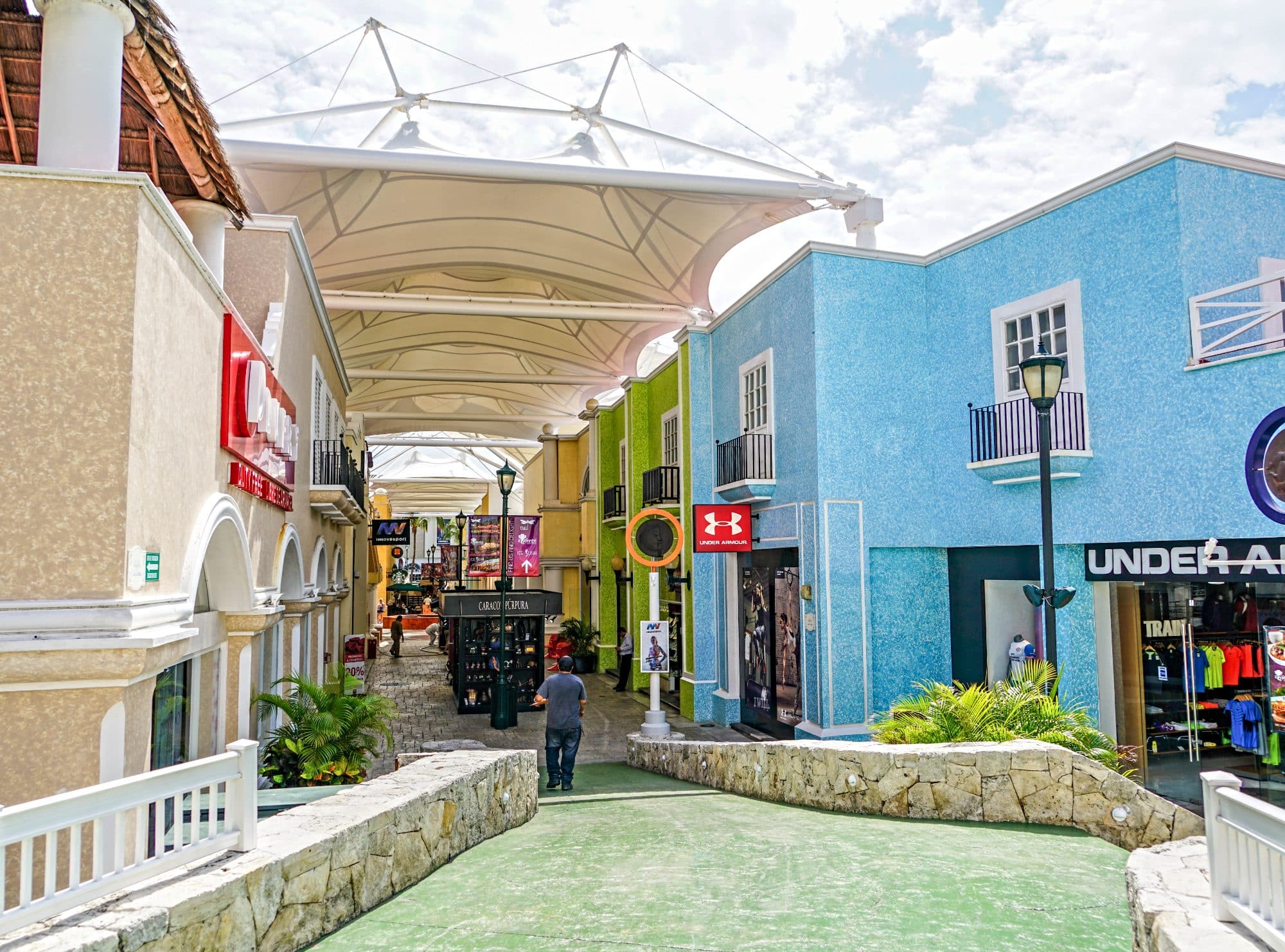
Buying a home
As it is a popular tourist destination, property values here have been on an upward trend. However, compared to the most significant metropolises in America and Europe, they still fall on the more affordable side.
This cost-effectiveness of Cancun real estate is what draws in folks looking to turn a profit or plant their roots here. So yes, reasonably priced homes in Cancun are up for grabs!
According to FarHomes, Mexico's real estate listing site, the average price of a home in Cancun is about $1,508,198 USD. Remember that averages can be heavily distorted by luxury properties entering the market. It is still possible to find a home for about $51,000 in Cancun, depending on your preferences, of course.
Owning real estate in Cancun
As a foreigner, you can buy and own property in Cancun. There are two scenarios:
- Outside restricted zones: If the property is located more than 50 kilometers (around 31 miles) from the shoreline and 100 kilometers (around 62 miles) from the border, you can hold the deed directly, just like a Mexican citizen. You'll have the same rights and responsibilities as a Mexican property owner.
- Inside restricted zones: In these zones, foreign ownership isn't allowed outright. But, there's a solution - a fideicomiso, which is a bank trust. A Mexican bank holds the property in trust for you. This gives you all the rights of ownership, like using and selling the property, but the bank technically owns the land.
Renting
If you're not ready to sign on the dotted line of a property deed, renting is an excellent alternative. How much you pay for rent depends on the area.
In upscale Puerto Cancun, for example, you can rent amazing condo apartments for up to $2,000 per month. In the Hotel Zone, rents can reach up to $3,000 USD per month for similar apartments.
Step away from the beach, and a decent 1-bed apartment downtown can be found for $550 a month.
If you do not mind living a 40-minute drive from the beach, you can find a small house in a gated community for the same price.
Our guide to renting and buying property in Mexico is a good place to start sorting out your home in Cancun.
Best neighborhoods
Within Cancun, you'll find a medley of unique districts, each flaunting its peculiar vibe and set of amenities. Here are some of the best places to live in Cancun:
Hotel Zone (Zona Hotelera)
As one of Cancun's most acclaimed neighborhoods, Hotel Zone oozes allure with its stunning beaches, top-tier resorts, gourmet dining establishments, and engaging nightlife.
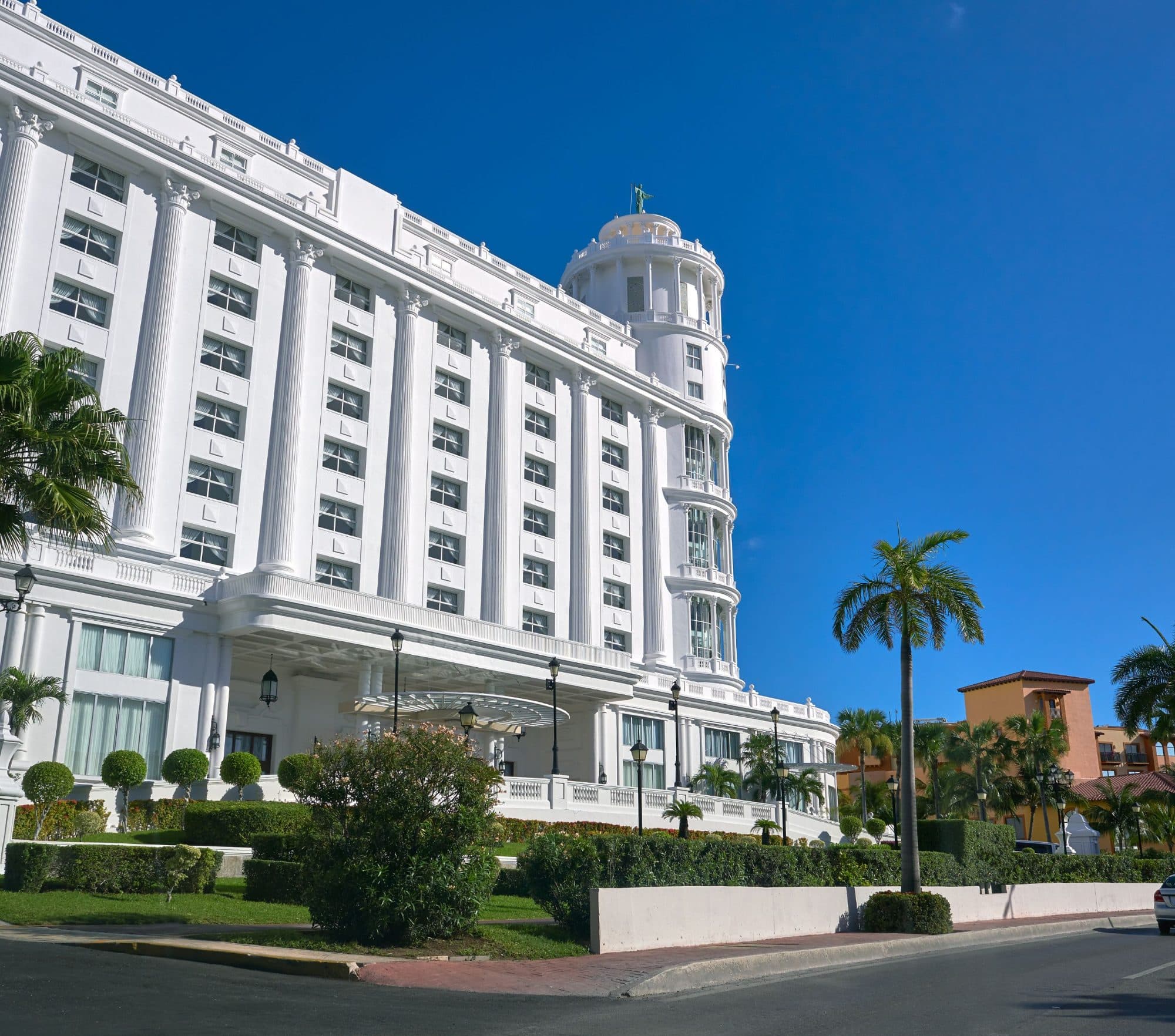
Here, you can effortlessly dip your toes in the sea, engage in exciting water activities, and revel in the breathtaking ocean views over the Caribbean Sea.
Real estate for sale and rent is available here. Almost every home or condo in the Hotel Zone gives you a chance to wake up to stunning water views, thanks to the exceptional natural scenery.
Add world-class shops, eateries, and beachfront – all just a stone's throw away from your residence, and you've got an unparalleled living experience. However, this is one of the most expensive areas in the region and, possibly, in Mexico.
It's also a tourist area and gets very crowded.
Downtown area (El Centro)
Cancun's El Centro, or downtown, offers an unfiltered glimpse into the Mexican lifestyle. From colorful markets with local produce and street food to nice local eateries and a variety of residential accommodations, you'll find it all here.
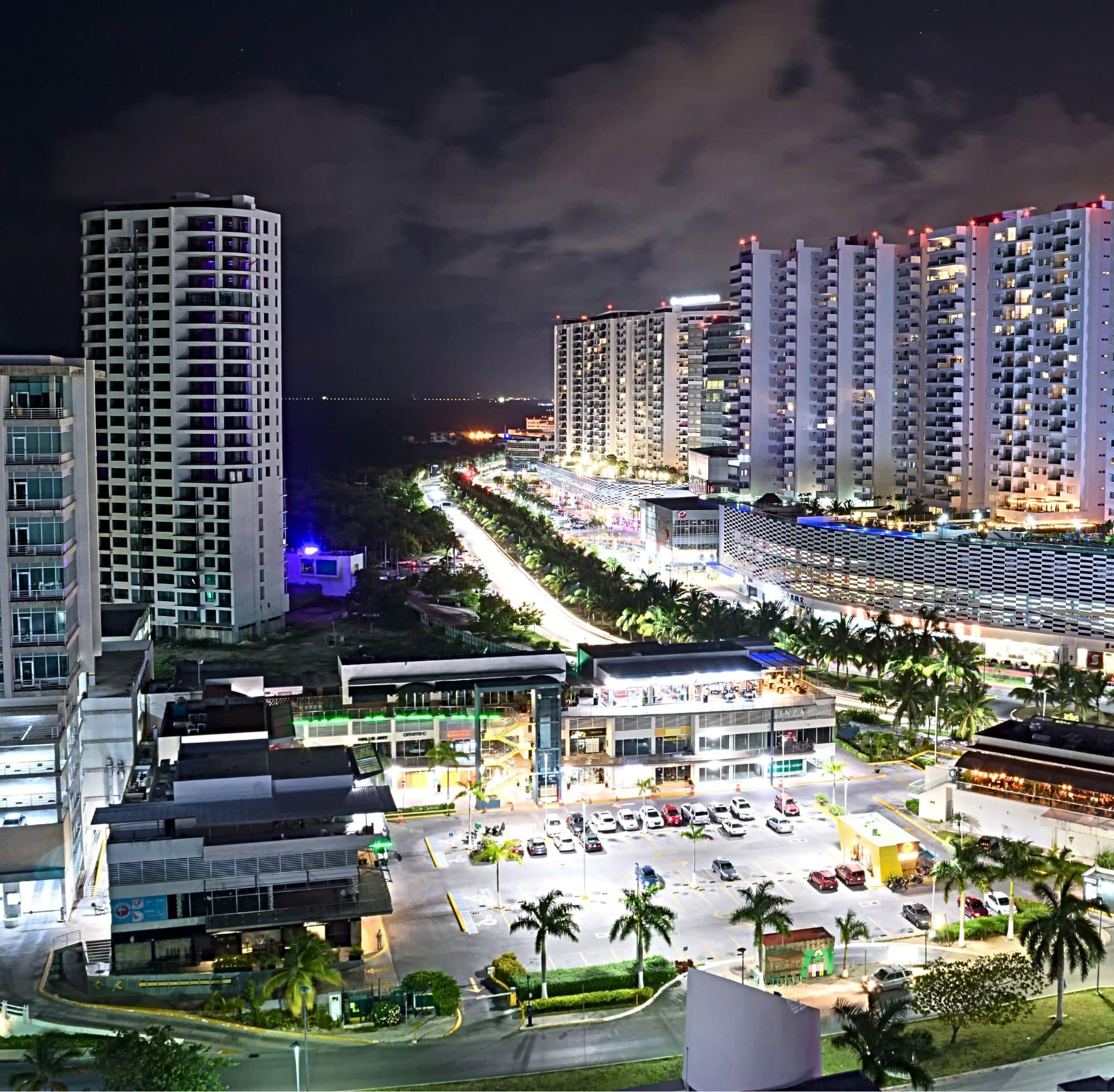
This is not your traditional city center; there's no feeling that the place is the heart of the city. It looks and feels more like a normal living and working area.
Avenida Tulum is the main artery in downtown Cancun, and it is full of shops and homes. This is where you go shopping to avoid tourist prices or walk to the Malecon to meet with your friends.
If you are seeking a more laid-back and traditional Mexican atmosphere and more affordable housing options, El Centro (Downtown) Cancun is an excellent choice.
The downside is somewhat limited beach access and a hectic layout of the area.
Puerto Cancun
Puerto Cancun offers an exquisite fusion of residential, commercial, and marina environments. Private gated communities, a brilliant golf club, and luxurious apartments with knockout views of the Caribbean Sea make it a lovely living area in Cancun.
It's not a stretch to say it's one of the most desirable neighborhoods in Cancun that caters to those dreaming of a plush and elite lifestyle.
While the beach is not directly accessible from all parts of Puerto Cancun, the community provides a serene and secure environment for residents.
Alamos
Known for its serene and family-centric ambiance, Alamos invariably draws both locals and expats. While still maintaining a convenient connection to the city buzz, it offers a calm, family-friendly oasis.
On the downside, it is further from the beach.
Residencial Cumbres
Another neighborhood with a family-friendly atmosphere is Residencial Cumbres.
Here, you will find well-established schools, green areas and parks, and shopping centers all within arm's reach. Houses, apartments, and land for rent and/or sale are available.
Puerto Juarez
This fishing village 2 miles north of Cancun, is the right place if you are looking for a leisurely lifestyle.
Here, you'll find a variety of local markets and affordable places for rent, as well as the ferry to the Isla Mujeres.
The local beach, Playa Ninos, has calm waters and is favored by local families. There's a marina for yachting enthusiasts and a good supply of places to eat out, especially fish and seafood restaurants.
Other areas to consider
Another option for a more relaxed lifestyle is Supermanzana 15 or 16. Away from the tourist turmoil, these areas offer local amenities and a more authentic Mexican living.
La Gloria, in the southern part of the city, is home to many expats and retirees. It’s known for its affordable housing and quiet streets.
Things to keep in mind when choosing an area in Cancun
Cancun's residential districts are usually well-equipped with everything you need for a comfortable living: swimming pools, shops, banks, gyms, and various entertainment options. Within walking distance, you'll also find lovely coffee shops, grocery stores, and a good choice of dining-out options.
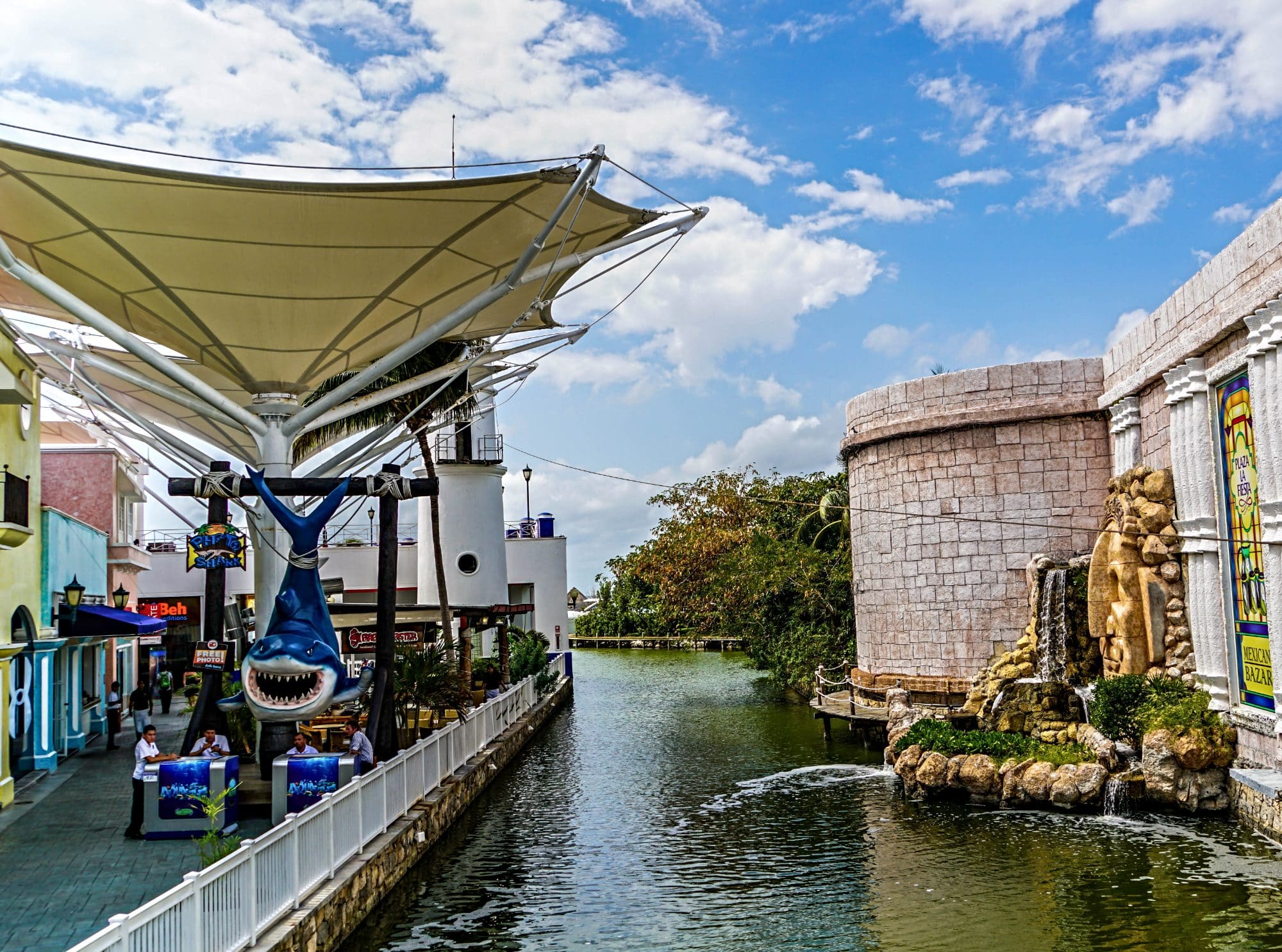
If you cannot afford a beachfront condo and are going to rely on public transport for your beach trips, check where the nearest bus stop is. Depending on the bus stop location and which beach you prefer, the beach trip might take between 20 and 40 minutes.
Do keep in mind, though, the buses in Cancun can get a bit crowded and lack air conditioning. This can be quite challenging when the temperatures outside soar into the 90s F coupled with 90%+ humidity.
Safety
Just like any city that's home to 600,000 plus souls with a thriving tourist hub, Cancun has its share of criminal activities and petty crimes. But don’t let this deter you! The dreaded drug-related unrest that plagues other regions of Mexico is far less common here. Cancun, in general, is considered a safe place in Mexico, and violent crimes are rare.
Healthcare
There are good hospitals and medical practices here, and a large portion of the city's health professionals are bilingual.
Healthcare in Mexico is much cheaper than in the rest of North America, and Cancun is no exception. Here are typical procedures and the costs you can expect:
| Treatment Type | Price in Mexico in USD | Price in the USA in USD |
| Routine Checkup | $12 to $15 | $265 |
| Complete Blood Work | $50 to $80 | $195 |
| X-Ray | $24 to $30 | $120 |
| MRI | $600-800 | $1,325 |
If you come from the United States, remember that Medicare does not provide coverage outside the US.
You might want to have a look at the IMSS Mexican health program - this will be the most economical way and will give you access to public hospitals and doctors. You can find more information in our guide to Expat Health Insurance In Mexico.
Another option is to get international health insurance to make sure you are covered in Mexico and your home country. International health insurance can be quite expensive. To make sure you get the best value for money, compare international health insurance options from various providers to find the best deal.
Getting around Cancun and the peninsula
Public transportation
If you do not reside right on the waterfront, getting to the beach will require public transport. It is also easier to hop on a bus if you want to travel to other parts of the city for your daily portion of entertainment.
The Zona Hotelera, for example, sprawls across 22.5km (14 miles), so it is more convenient to use a bus or a taxi than to get everywhere on foot. The only exception is Downtown (El Centro) - it is a compact area, and some parts of it are pedestrianized, making it easy to walk around.
Local buses are a popular mode of transportation - they cover all the major tourist areas, including Downtown and the Zona Hotelera (Routes R-1, R-2, and R-27).
If you live in a neighborhood away from a city bus route, you can use colectivos (shared minivans) to get around. They stop at designated stops, but you can get on and off anywhere on the route.
Driving in Cancun
Having your own car might be a nightmare - the traffic is relentless, and parking is scarce.
If you wish to explore the stunning Yucatán Peninsula and its many attractions, renting a car is one of the options. Make sure you rent one with a credit card and have a photocopy of your passport and your international driving permit with you.
Tren Maya
The new Tren Maya has also opened recently and will offer residents and visitors quick access to the entire Yucatan Peninsula!
The Campeche–Cancún section commenced operations on December 15, 2023, with the rest of the line to follow later. The railway begins at Cancún International Airport and travels southwest towards Palenque, Chiapas, via two routes that encircle the peninsula.
Socializing and making friends
There are plenty of opportunities to meet people and find fun things to do in Cancun.
Ever thought about joining a social group? Give the Cancun International Women's Club a try. They're always up to something - think charity events or cultural get-togethers.
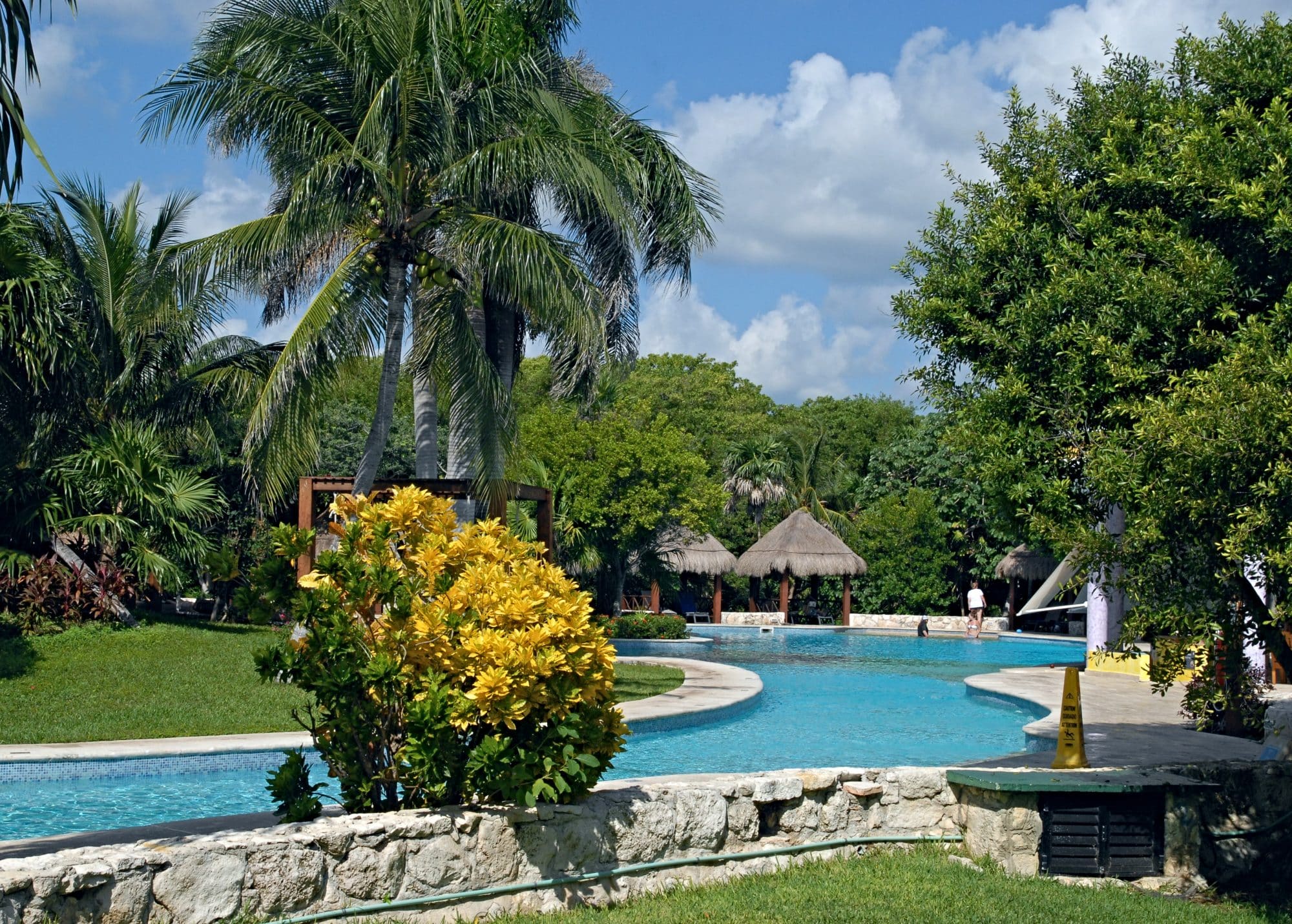
How about picking up Spanish while you're in Cancun? Multiple Spanish Language schools offer engaging classes. It's a great opportunity to meet other expats and opens doors to better communication with locals. It is also a great way to boost cognitive abilities and memory and keep your brain cells exercised.
If you enjoy an active lifestyle, Cancun's got you covered. There's a host of golf clubs and gyms that cater to expats.
If golf is your game, try the Riviera Cancun Golf Resort. Sprawling across a generous 7,000 yards, this 18-hole course is a fascinating blend of mangroves, exotic native plants, and fabulous vistas of the crystal-clear Caribbean Sea.
If you are seeking a lively, active retirement laced with regular golfing adventures, Cancun might just swing it for you!
Looking to mix it up a bit? Try a local cooking class. You can pick up how to make delicious guacamole, meet fellow foodies, and enjoy some mouthwatering dishes.
Things to do in Cancun
If you are into water sports, theme parks, exploring nature and historic ruins, and like finishing your day with a good night out - you are in the right place.
Explore cenotes
Cenotes are natural freshwater pools found all over the Yucatan Peninsula. Start with visiting the well-known cenotes in Cancún, Playa del Carmen, and Tulum.
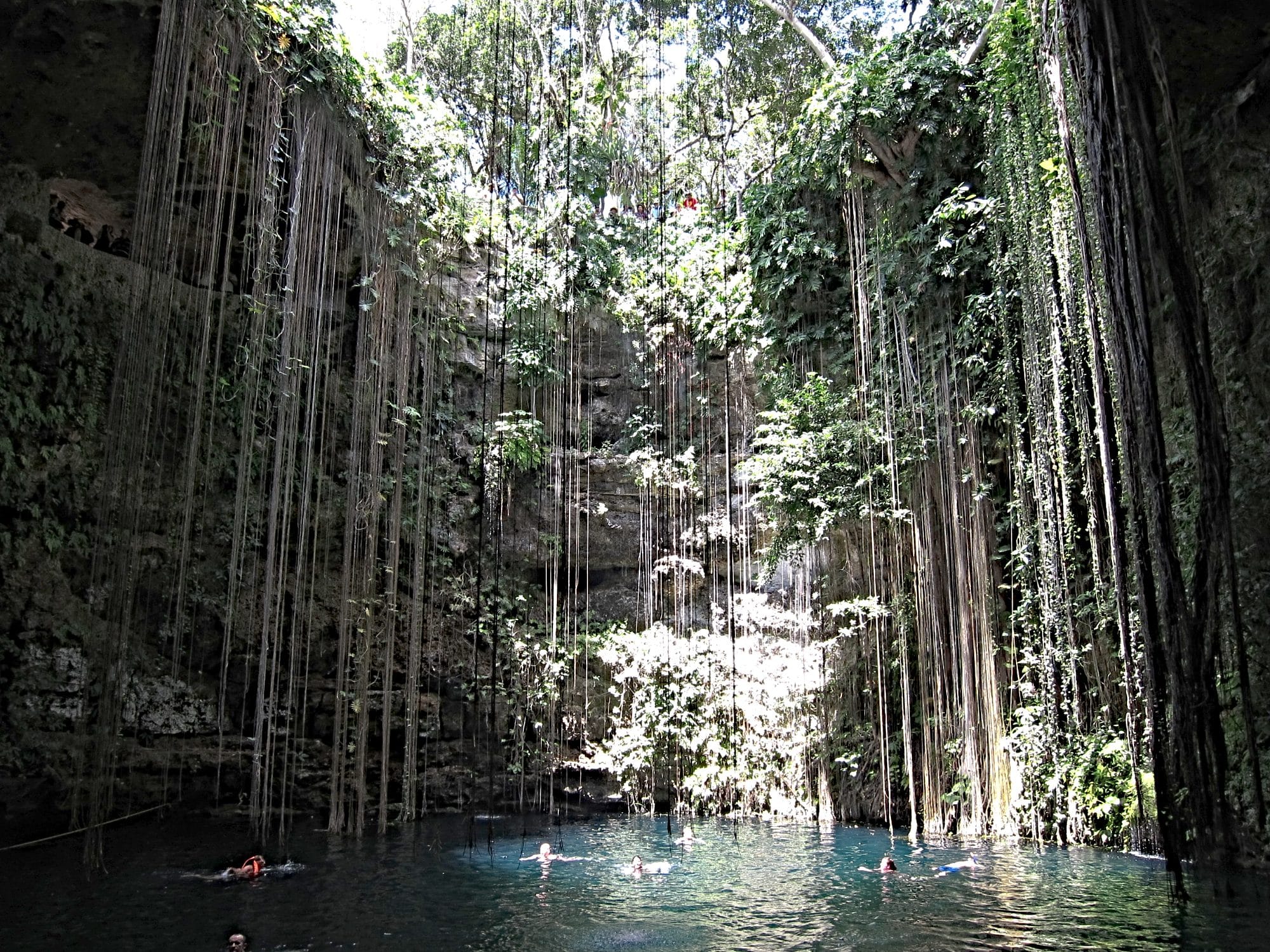
For the next adventure, you can seek out hidden cenotes preferred by locals. These are not only less crowded but also more affordably priced.
How about kicking things off with Xenotes Park? Here, you can revel in the splendor of cenotes and tap into your adventurous side. Moreover, it's not just about sightseeing; Xenotes invites you to take a plunge into activities like kayaking, zip-lining, and rappelling.
Visit theme parks
There's no shortage of amusement and water parks in this part of Mexico.
Xcaret is a water, theme, amusement, and eco-archaeological park all in one in Playa del Carmen.
There is an underground river, beach area, and lagoon for those who want to explore the Mayan waters, plus a Coral Reef Aquarium, spectacular dance shows, and caves to Mayan villages.
Xplor, part of Xcaret, offers the highest zip lines in the River Maya, so you can enjoy some of the best views in Cancun as you descend the zip line.
Xel-Ha Water Park is a place to discover the natural beauty of Mexico with fun-filled activities such as the Scenic Lighthouse with a huge waterslide and the River Tour Xel-Ha, which takes you to one of the greatest snorkeling spots in the area.
Garrafon Park, 25 minutes from Cancun, offers all kinds of action, from snorkeling to kayaking and zip-lining to tours of the island.
If you live in Cancun with a family, Ventura Park will be one of your favorites: the waterslide park, Wet ‘n Wild, adrenaline-pumping rides, and a zip-line and bungee swing.
To explore Cancun's stunning natural beauty, head to Native Park, a devoted eco-center made up of five distinct parks. These parks help maintain the area's lush jungle and aquatic ecosystems.
Arts and music
Don't forget about Cancun's thriving art scene too. From visiting stunning galleries like the Museo de Arte Popular Mexicano to enjoying local music festivals - whether you're an artist yourself or just appreciate art, the city's got ample cultural festivities.
It's not all Mariachi bands and Salsa dancing here - although those are certainly still part of the fun.
Take Jazz Festival Riviera Maya, for instance. Every November, the festival gathers hundreds of jazz enthusiasts in Playa del Carmen.
Cancun clubs attract many dance music lovers. Award-winning DJs from across the globe lay down their beats here for an unforgettable experience of music and dance.
Famous musicians often perform at popular spots like The City Club or temporary beach setups during spring break and holidays, creating memorable nights.
Other activities
Cancun and its beaches offer a wealth of activities: diving and snorkeling, exploring coral reefs, sailing, boating, paddle boarding, jet skiing, parasailing, scuba diving, and others.
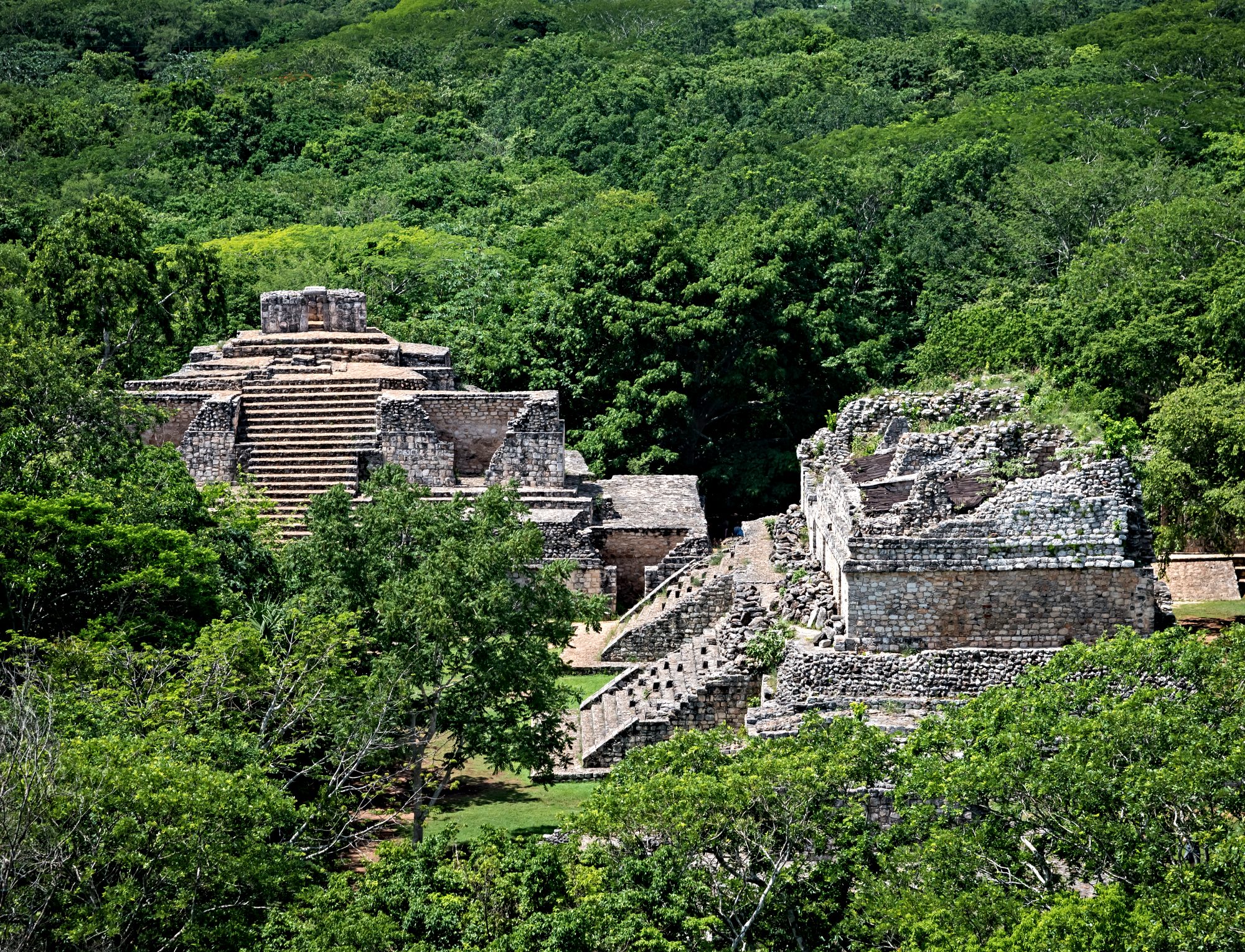
Cancun also has its fair share of Mayan ruins; some are right in the city, and others are spread all over the Yucatan. Chichen Itza, for example, was the major city-state in pre-Hispanic America.
You can explore the pyramids on your own, but the best way is to book a guided tour - you will learn so much.
Useful tips
Learn some Spanish
Yes, it's true that Cancun is very touristy and a lot of Mexican people can speak English. But when it comes to navigating local markets, a basic understanding of Spanish numbers might come in handy. Plus, knowing just enough to ask for directions or make specific inquiries can make your expat life that much smoother.
Have some cash on you all the time
Although US and European debit and credit cards are accepted, in some places, you do need cash - street stalls and beach stalls, taxis, etc, will ask for cash, so it's useful to have some in your pocket all the time.
Storms and hurricanes
From June to November, Cancun experiences what is known as the hurricane season. During this period, tropical storms are common, especially between August and October. It's worth noting, however, that Cancun has been quite lucky when it comes to major hurricanes. While tropical storms and hurricanes have passed close by on numerous occasions, Cancun has faced a direct hit only twice.
Heat and humidity
Before you commit fully to living in Cancun, make sure you can service the “canicula,” the hottest six weeks of the year from mid-July to the end of August. Some people say the heat and humidity in this period are hard to bear.
Living in Cancun - summary
Cancun offers a mix of bustling city life and serene beachfront scenes, but there are some things to consider.
The city's tropical climate can be intense, and while housing options are diverse, affordability varies. So, if you're thinking about making Cancun your home or planning a visit, take your time to weigh the pros and cons before making a decision.
If it feels a bit too much, you might want to have a look at other popular expat locations on the Yucatan Peninsula.
Other popular locations in Mexico to consider:
- Living In San Miguel De Allende As An Expat
- Living In Mazatlán As An Expat
- Living In Puerto Escondido
- Living In Baja California Sur & La Paz
You might find useful:
- About visas and legalities of moving to Mexico - Living In Mexico As An Expat
- Other popular locations in Mexico - Best Places To Live In Mexico For Expats
Secure Peace of Mind with Best-Value International Health Coverage
International Citizens Insurance provide free, no-obligation quotes from the leading international health insurance providers with plans tailored to meet your needs. Trusted by thousands of expats worldwide.







